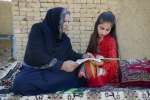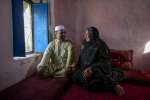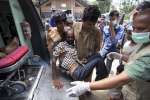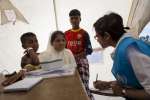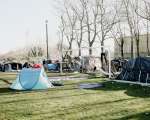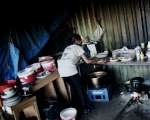Refugees in India share daily struggles with UNHCR chief
News Stories, 21 December 2012
NEW DELHI, India, December 21 (UNHCR) – Urban refugees in the Indian capital told UN High Commissioner for Refugees António Guterres of their daily challenges during a two-day visit in which he discussed concrete steps for strengthening UNHCR's partnership with the government.
Guterres visited a refugee centre in New Delhi on Thursday and met eight exiles from Afghanistan, Myanmar and Somalia. They told him about the financial difficulties they face, and the challenge finding places to stay.
"We live on railway station platforms and in open fields. We have nothing to eat. The world is watching our plight, but no one is doing anything," claimed 44-year-old Fazal, a Rohingya refugee from Myanmar. India has kept its borders open to the Rohingya and allowed them to stay and work.
High Commissioner Guterres spoke warmly about India's generosity towards all refugees. On Wednesday, he met External Affairs Minister Salman Khursheed and Home Affairs Minister Sushil Kumar Shinde for talks on boosting refugee protection and strengthening ties between UNHCR and India.
"It is a special time in relations between UNHCR and the government," he said. The government has discussed possible timelines to address issues like the issuance of long-stay visas and work permits to refugees and the naturalization of Hindu and Sikh refugees from Afghanistan.
Although India has not signed the 1951 UN Refugee Convention and does not have a national refugee law, the human rights of refugees and asylum-seekers are protected by the constitution. They have access to health care and their children can go to school.
However, they say that they face challenges as refugees on a day-to-day basis, such as discrimination, finding accommodation and employment. Women, especially in New Delhi, don't feel safe, even in their homes.
Wilo, a single mother with eight children, claimed that Somali women face discrimination all the time. The High Commissioner later said he was distressed to hear about some of the problems the refugees faced. "We must work together with governments to increase [and improve] safety for women [and all other refugees]."
There are about 22,000 refugees and asylum-seekers under UNHCR's mandate in India, and many more Sri Lankans and Tibetans directly assisted by the government of India.
"God has given responsibility to some human beings to take care of other human beings." Fazal from Myanmar told the High Commissioner. "Your institution is one of them. We are grateful that you have come from so far to listen to us. Please help us."
By Nayana Bose in New Delhi, India








